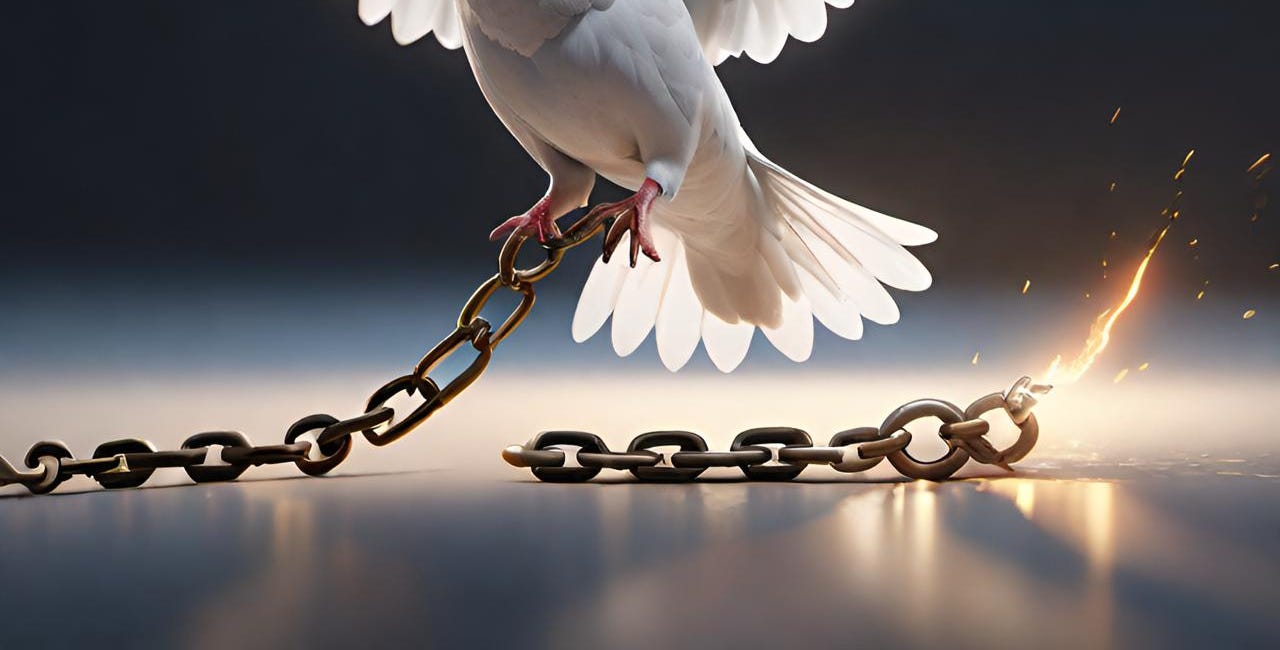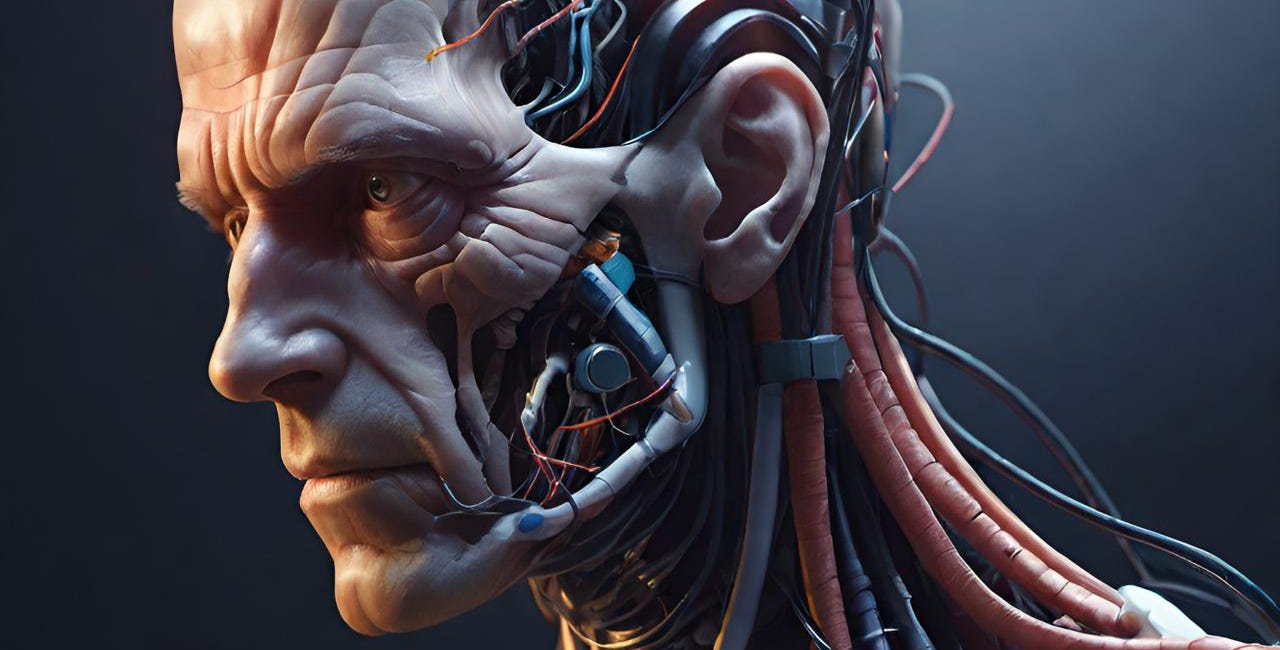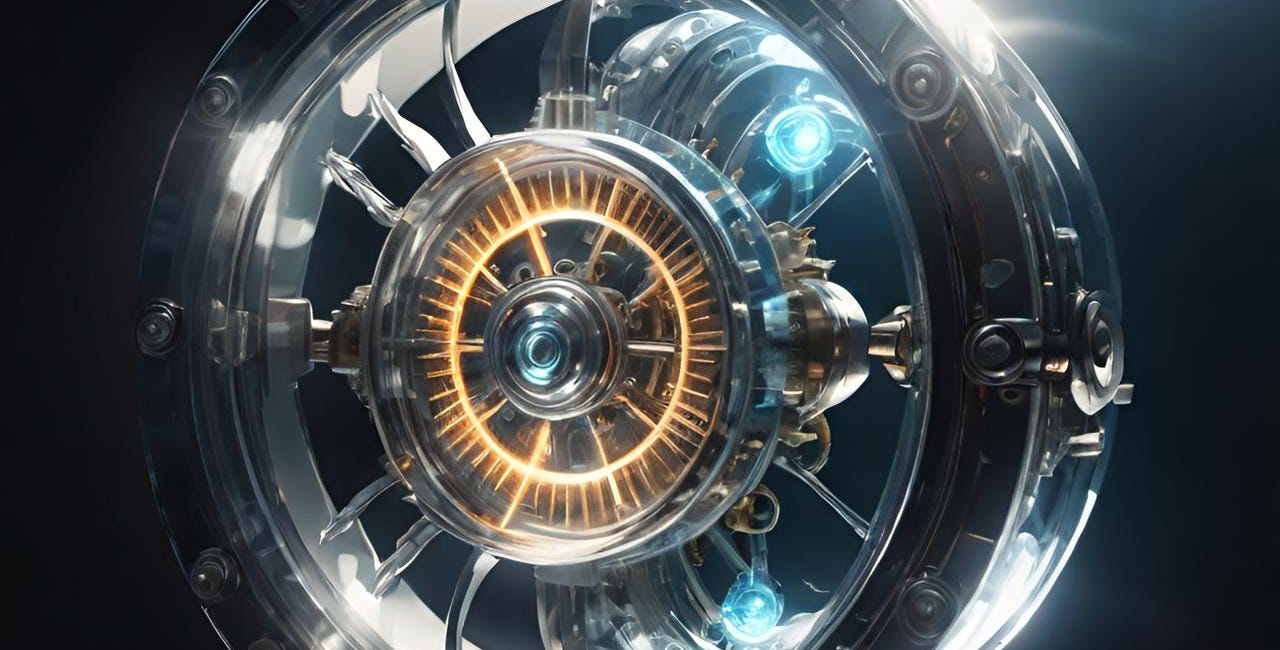Free Will Revisited
Accountability does not require 'free will'. Blame does.
Think of the butterfly-effect nudges of fate, the smallest, most randomly fallen pebbles in the river of time, slightly bending the current of your life, navigating you to — given time — completely different outcomes than where you could have ended had you not collided with those tiny influences. Even if you row against the current, you are still forced to respond; your will “to will” is expressed involuntarily. And even with a steady flow of time without any external input, you are still reliant upon — still at the mercy of — the randomness of your stillness.
Who you are, who you are attracted to, what you want, what you need, how you respond to stimuli… they are results of cognitive processes defined by your randomly structured neural network.
Your ‘free will’ is as free as your understanding of this fact.
Deterministic emotions
Imagine the random little events that grant you lived experiences, their ingrained effect altering your perception, your emotional base, the way you view things, and the way you weigh things whenever you make decisions or whenever you evaluate value and threats.
Every assessment you make is a projection of your worldview, and your worldview is the result of your lived experiences — randomly acquired experiences.
Every decision you make was made for you long ago when your mental algorithms were being shaped by forced beyond your control.
Consider those tiny impressions that cause you involuntary emotional responses, which in turn determine your decisions. If you have any experience in marketing or sales, you’d know that all of our decisions are determined, or at least influenced, by emotion. And the logic part of a decision equation is about rationally weighing how we respond emotionally to different stimuli. Logic follows emotion in what we need and want, and why we need and want it.
And when you follow your gut feeling? That’s your emotional response to things, which is why you can’t put your logical finger on it when you feel your gut telling you things. Why you respond a certain way depends solely on your experiences in life — randomly acquired experiences. The “random” part of this, which defined you, has always been beyond your control.
Acknowledging this means you have no free will, but you still have agency.
Why make this distinction?
Because it holds massive potential for useful insight. Please, read to the end.
The determined self
So, you see, you might think you freely ‘will’, but your will isn’t free — it never was. It cannot be free, otherwise you wouldn’t be ‘you’. You are defined by fixed, unfree parameters. If they were fluid, then ‘you’ would be hard to define, impossible to determine; what made you ‘you’ would have had no defining boundaries, which, unfree as they are, serve to determine your individuality.
A claim of ‘free will’ is a denial of self. But does this mean deterministic fatalism to the point of giving up on everything?
Hell, no.
If you randomly happen to acquire the realisation that you are unfree, and let’s say you randomly respond with the need for positive change, then you can change. Does it matter that the cognitive processes that led you to this positive decision were unfree?
So what if your decision and capacity for positive change are deterministic? You can change in a direction, but all within the parameters of your nature. You are unfree in the prison of your nature, but there’s a bigger prison yard to move around in if you recognise it as the prison it is. If you imagine you’re free when in fact you’re in bondage, you are further imprisoned by your delusion, your situational unawareness.
Your mistakes do not define you. They tell you who you’re not.
— 3 Doors Down, ‘It’s the only one you’ve got’
People hate it when you take away their boast of “free will”
My position that free will does not and cannot exist tends to infuriate many, understandably so.
I get it.
It’s predictable to take offense at this claim since it’s easy to (mis)interpret it as a denial of agency, and therefore, individuality — even though you’ll never meet a more vehement proponent of individualism than me.
What’s even more horrifying is their hasty conclusion that my denial of free will is somehow an exoneration of criminals of their crimes… that acknowledging determinism is somehow the enabling of professional victims who never take ownership of their mistakes in life.
Nothing could be further from the truth.
Accountability is not reliant on free will. A rabid dog has no free will in its aggression; we still put it down. Likewise, we still hold responsible for their actions a criminally insane shooter who ended up that way due to being (repeatedly) sexually abused as a child, not to mention the abhorrent pharmaceuticals and brainwashing they were subject to.
So what? Do the deterministic factors that made them that way mean we need to tolerate their abusive inclinations?
We provide no excuses, but we do honour explanations.
Yes, we know abuse is cyclical, and the abused tend to mirror their abusers. But this explanation is not an excuse.
Still, there is insight in acknowledging determinism (the non-existence of free will):
How many fucking times do I have to say this?
Don’t give people excuses and exonerations, but give them their explanations, not to absolve them, but to give them a shot at detaching their identity from their past mistakes, and therefore, motivate them to stop doing them.
The more you try to convince them they “freely chose” to make mistakes, the more they conclude that they are fundamentally flawed — the more they identity with their mistakes, and then, the more they feel compelled to validate their identity by deliberately making more of those mistakes. There is nothing more fatalistic than this: the claim of “free will” promoting a fatalistic attitude.
We are all programmed by our nature to seek an identity and to desperately need to validate it. So much for “free will”. Thus, the more you batter and shame people with the cruel claim that “they freely chose” their debilitations — on top of them having to suffer the consequences of their mistakes — all you do is push them towards the direction of, you guessed it, making more mistakes… this time deliberately, simply to validate a much-needed identity.
Objections
The irony is that the most vehement, foaming-at-the-mouth supporters of supposed “free will” tend to make the most ridiculous mental-gymnastics excuses for their imagined deities — deities that are sadistic, petty, jealous, oppressive, and who deliberately deprive people’s freedom to will (Exodus 4:21).
It baffles me how some people insist on not getting this simple concept: that who you are is made of constants, and what created those constants was 100% randomness, if you drill down far enough. And the irony is that it’s predictable and psychodynamic why they do this — so much for their “free will”:
People don’t like to be told that the sum of who they are and how they think is the result of randomness. It takes humility to accept that we aren’t as grand and god-like as we’d like to believe we are.
Here are the most common objections:
“But what about our decision-making? Doesn’t that prove free will?”
No, it doesn’t. It proves the opposite. What determines good decision-making in some and bad decision-making in others, especially when we are all designed by our nature to seek maximum utility? So much for free will if we are biologically programmed with instincts. Your cognitive flow, or mental processes that lead one person to conclude completely differently than someone else, is governed by the already established, already ingrained by the myriads of “if, then, else” conditional-reasoning structures defining the inevitable conclusion of your cognition.
“But if there is no free will, then no one is accountable for their actions.”
See the reverse-engineering aspect of this objection? It goes like this: since we want accountability, we must assert that free will exists, or that free will exists just because it’s convenient for us to believe so. Yet, accountability and determinism can coexist. It is a straw man and non-sequitur to assume that, just because free will doesn’t exist, then accountability must not exist either. If you don’t understand why yet, I urge you to keep reading.
The non-existence of free will does not necessarily rob you of your accountability, agency, and individuality. Far from it. If anything, acknowledging you have certain deterministic inclinations and still trying to make decisions despite them is the most free will you can experience.
“But how can you blame a criminal for his crime if free will cannot exist. How can anyone be responsible for their mistakes if they were condemned to act a certain way?”
You can blame him because his victims are also condemned to feel resentment towards him. So, considering the deterministic nature of our thought processes and mental pathways, he didn’t have a choice but to commit a crime; but also, his victims have no choice but to want to reciprocate. So, while the criminal may give himself some slack for feeling compelled to commit a crime, he cannot escape his responsibility to his victims, who also feel compelled to seek justice.
Therefore, while free will as such does not exist (since we are who our random nature made us), this still presents no justification for excusing a crime. We still put down a rabid dog. The rabid dog has no choice, but we — its victims — still have no choice but to respond to its aggression. We are the ones holding it accountable. We don’t need any other moral imperative from a delusion of “free will”.
Accountability without free will
If you would just try to escape your ‘free will vs. determinism’ false dichotomy, you’d see that I’m trying to separate accountability from fault, responsibility from blame. The only difference is compassion and empathy.
I am also trying to separate self-esteem from narcissism: if you appeal to your supposed “free will” to claim full credit for your successes, then you refuse to recognise random deterministic factors that led to your successes, which means you are hubristically arrogant.
You can have accountability even though you don’t have free will.
Free will is not a prerequisite for accountability.
Also, holding yourself accountable (where you had the power to avoid making a mistake) is empowering. Why? Because when you recognise the role you played in your misfortunes, you see where you had and still have power and control over your environment. Again, this realisation is deterministic, because you somehow found insight enough to make you wise this way. But does it matter? You still hold yourself accountable (not blame yourself). You do this, not to punish yourself needlessly, but rather, to empower yourself through the recognition of your control over your life.
So, despite the inevitability of determinism and the non-existence of free will, you must still be accountable to yourself if you want to empower yourself. And you must still be held responsible for harming others because others have no choice (no free will) but to want to seek reciprocity for the harm you caused them.
Accountability is not blame
There’s a certain narcissism and schadenfreude in the claim of ‘free will’.
I’ve noticed a trend… a type of person who deems himself “successful” and who feels the need to disparage those less than him. Such a person seems to enjoy accusing the downtrodden, perhaps out of a need to avoid showing compassion for them, or perhaps a twisted joy in seeing others suffer; and to mitigate his guilt for his schadenfreude, he rationalises the world so that the downtrodden somehow “deserve” their pain. The irony of the unfree nature of this psychodynamic…
Don’t find fault, find a remedy.
— Henry Ford
Recap
Sorry for repeating, but when faced with people who argue in circles, repetition is a must.
I’ve had countless discussions with free will advocates who keep arguing in circles, like broken records, that accountability somehow cannot exist without free will, that the two concepts are somehow intertwined. They are not.
I explain again and again that, despite our unfree will due to our already established psychodynamics, we are still responsible (not to blame) for our mistakes because we are the ones who have to live with them. Plus, recognising our mistakes is empowering. I also keep explaining that, despite our unfree will, we are still responsible for our crimes against our victims, because their unfree will also compels them to seek reciprocity.
The blame game
Then it dawned on me:
Proponents of “free will” want not only to keep others accountable; they want to blame them on top of that. And there’s a huge difference here: Blame deprives people of empathy. This is what it all boils down to.
Blame is not only cruel and unforgiving, it also entrenches people in fatalism, as it promotes the notion that their crimes and mistakes are a defining trait of who they are.
“If you have free will and you still choose to make mistakes, then making mistakes must be a defining characteristic, right?” How the claim of ‘free will’ promotes fatalism…
Malicious, shaming, guilt-tripping, and blaming deprive people of recognition for their afflictions, simply out of spite. If you would not exonerate criminals, but at least recognise the trauma that led to their misery, then perhaps we’d have fewer criminals out there.
Empathy without exoneration… Who would not be motivated to change to the better, had they received such compassion?
Example:
The worst crime imaginable, which is the molestation of children, is always, without exception, committed by people who were similarly traumatised themselves. Not all victims of child molestation turn child molesters themselves, but if you are to show compassion for victims of such a crime, at least give them the benefit of an explanation — not an excuse — for why they were compelled to act a certain way.
Give compassion to them when they were innocent and had to go through such life-destroying trauma… or are you afraid that you’d turn out the same had you had the same trauma?
Be suspicious of people who say “accountability” but in fact mean “blame”.
Those resisting to the concept of accountability despite unfree will basically revolve around one grievance only: they don’t like being robbed their “prerogative” to blame people for who they are, which is as deterministic, fatalistic, and unfree as it gets. On the contrary, by explaining why someone committed a crime (without exonerating it), we separate an individual from their actions, and have more of a chance of them realising they don’t have to identify with their crimes. But if you insist using psychological abuse (blame) to instill in them the identity of the criminal, then guess what, they will identify as criminals, and therefore will want to commit more crimes to validate their identity. Some compassion could have averted so many crimes…. And again, to make it AGAIN crystal clear for those dedicated to deliberately misinterpret me: compassion does not mean exoneration or absolution of someone’s crimes. They still need to pay for them, otherwise we’re enabling them to keep committing more crimes. But blaming them on top of having them pay for their crimes also has the same effect: it keeps them wanting to commit more crimes because you help them identify with their crimes. Compassion, or an explanation, a benefit of a doubt, or extenuating circumstance for why they committed crimes, are not to exonerate or absolve: the function of compassion is to separate the crime from the criminal, and perhaps give them a chance to want to make amends as a way to dissociate from the false identity of the criminal.
Accountability without blame means you are responsible for your mistakes — you are still to pay for them because you made them. But you are not to blame for them because your will, being unfree, compelled you to be stupid, ignorant, or evil enough to make them. But if you are spared the blame, if you are granted compassion through the recognition of the deterministic forces that drove you to make mistakes, then perhaps you stand a chance of dissociating your identity from your mistakes, and therefore, you might feel compelled to avoid them in the future. I’ll say it for the infinitieth time: compassion, empathy, and understanding do not mean exoneration. You are still responsible for living with your mistakes and paying for your crimes. As long as we can separate blame from just accountability. Can you do that?

Why insist on unfree will?
My argument is not fatalistic; my argument is one of empowerment because it suggests self-ownership DESPITE deterministic psychodynamic forces of our existence.
Only when we are aware of the prison of determinism can we have a measure of freedom within its confines
No creativity, initiative, insight, or optimal decision-making is possible if they don’t come from a place of safety. Don’t tell me that the safe environment you happened to find yourself in was of your choosing. And even if it were of your choosing, simply having that choice and the capability to take it were again the consequence of randomness. So what credit do you imagine you’re entitled to here?
Why does it matter to talk about the non-existence of free will?
Because it gives credit to people for their misfortunes, without robbing them of their accountability. This avoids self-blame and self-punishment by detaching their failures from their core self. While still owning up to their mistakes, they can take solace knowing that their poor choices were the result of random bad luck, not of their innate self. To insist that they “freely willed” their misfortune is to suggest that they are fundamentally stupid, incompetent, or evil, which is the most fatalistic notion there is.
Rejecting ‘free will’ takes away false credit from the fortunate, without robbing them of their achievements. This saves them from narcissism and god-complexes.
Conclusion
Everything is deterministic. If it’s not deterministic, it cannot be defined. Your will is unfree, but so what? Does it reduce you as an individual? No, quite the contrary. Determinism determines who you are; it defines you. Without defining inescapable attributes, you are no one, and you are nothing.
You want freedom? The realisation that you cannot escape your nature is the only measure of freedom you can have, and perhaps the only freedom you need. To acknowledge your chains is to be as free as you can be, as free as you need to be — much freer than those who are blind to their servitude.
Any freer than that — the realisation that you are unfree — would blur the boundaries and framework of who you are: you’d be anything and nothing — a no one. You wouldn’t exist, because you need to be determined by your parameters of individuality, by your unfree will.
And perhaps this is the crucial difference between determinism and fatalism: fatalism is the complete surrender to psychodynamics, living a life simply responding to stimuli, giving up to the current. Determinism, perhaps, could mean acknowledging the deterministic factors of our being, but in doing so — by gaining an awareness of them — we gain a broader vision of what is possible for us. This is freedom.
And perhaps this is the only measure of freedom we can have or even need.
Key takeaway
Seek accountability, not fault or blame. Fault and blame define a man’s fatalistic identity because they promote the notion that the man freely chose mistakes. In contrast, accountability alone shows him he must pay for his mistakes, but he can also do much better, since it is within his power: the power from responsibility.
From great power comes great responsibility?
No, it’s the reverse:
From great responsibility comes great power.
The Narcissism of "Free Will"
The miserable man wants to believe that all misfortune must be fully attributed to factors outside of his control, a coping mechanism to relieve him of self-blame on top of suffering failure. The successful man wants to attribute all his accomplishments to himself and his alleged “
Some Compassion
That woman you call a loser for not making much of her life? She was brought up by enmeshing control-freak parents. They taught her from a young age to dislike and distrust herself. This gave her a crippling handicap and a late start in life. She didn't get the same shots you did. But despite her wasted youth, regrets, and mourning of an unlived life, s…
Why I reject free will
Every time I suggest that free will may not exist, I get a lot of emotionally-driven flack - we don’t like to be reminded that perhaps we aren’t as free as we told ourselves we were. Yet unfree will is not necessarily bad; and this coming from an individual freedom advocate.
Free will oxymoron
If causation dictates all, then free will cannot exist. Your neurons are wired a certain way; your synapses follow neural pathways that form your mental architecture, a predictable result of genetics and random life experiences within circumstantial environments. Everything you perceive, analyse and conclude must go through your mental processes. Your w…
What is the meaning of existence?
The most important question is why we exist; what is our purpose, and how do we derive true meaning from an existence forced upon us without even the courtesy of an explanation?
What is God?
Tolkien writes: “All we have to decide is what to do with the time that is given us.” At first, this may be perceived as a testament to free will. But how free are we to will the processes by which we will? How free are we when all the freedom we have is to freely move about in our tiny prison cell; a cell without windows, without even a hint of possibi…
Excuses vs. Explanations
People seek absolution for their mistakes all the time. They commit hurtful acts to themselves and to others, and then they expect exoneration based on deterministic factors that led them there.
Excuses vs. Explanations [Part 2]
How I loathe those aggressive “motivators” with their fake bravado, condescendingly arrogant bragging, outdated militaristic coaching, and their pretentious holier-than-thou attitude of “no excuses”. Ask them why their naive followers keep failing, though, and they’ll shower you with every pitiful excuse in the book — all except admitting that perhaps t…














![Excuses vs. Explanations [Part 2]](https://substackcdn.com/image/fetch/$s_!Oqpw!,w_1300,h_650,c_fill,f_auto,q_auto:good,fl_progressive:steep,g_auto/https%3A%2F%2Fsubstack-post-media.s3.amazonaws.com%2Fpublic%2Fimages%2Fd67034be-0a14-4b8e-abfd-c6b4b6443042_1376x768.png)